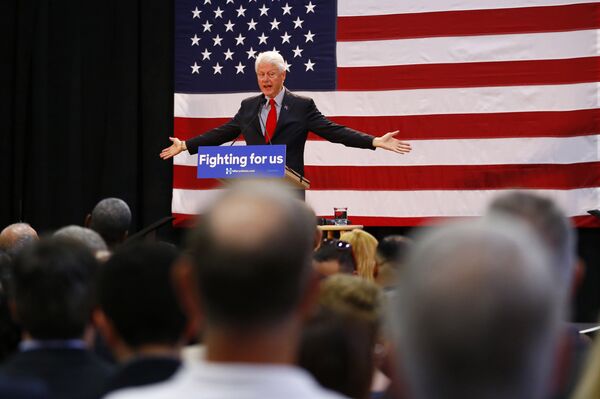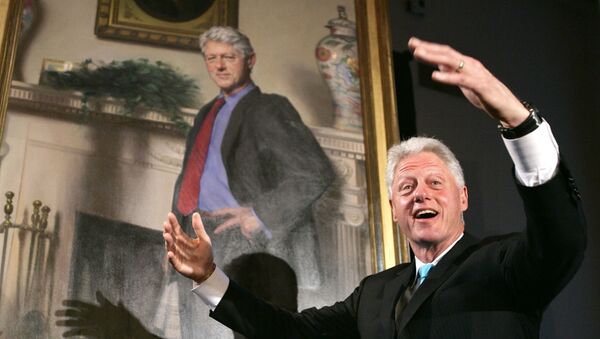WASHINGTON (Sputnik) — Democratic presidential frontrunner Hillary Clinton announced earlier this month she would appoint her husband, the 42nd US president, in charge of the US economy if she is elected president in November 2016.
"The Clinton record is mixed," University of Pittsburgh Professor of International Affairs Michael Brenner said on Monday. "He rode an economy that benefitted from some structural advantages and a global upturn while initiating nothing significant."

Bill Clinton aggressively pursued financial deregulation and free trade deals, and implemented additional measures that contributed to continued income redistribution upwards, Brenner pointed out.
Contrary to widespread misperceptions, "the 1990s did not see any noteworthy improvement in living standards for the 90 percent of the American people."
While in office, Clinton changed the formula for calculating the inflation rate to make it statistically smaller, Brenner recalled.
Clinton "did the same with the unemployment rate, and encouraged lazy enforcement of antitrust and a host of other regulatory rules."
Since leaving office, Clinton has strongly backed the Bowles-Simpson proposal that cuts Social Security and Medicare and extends tax giveaways to the rich, Brenner noted.
If Hillary Clinton is elected US president and does put her husband in charge of economic policy, the American people can expect "more of the same," Brenner predicted.
Bill Clinton would advise his wife to continue the policies of favoring the concentrations of great wealth and the Wall Street financial conglomerates that he, George W. Bush and also current President Barack Obama had all followed, Brenner said.
Hillary and Bill Clinton would both avoid any confrontation with the major US financial interests, so that "the Republicans will dictate the terms of economic policy," he argued.
However, Executive Intelligence Review senior editor Jeff Steinberg predicted that Bill Clinton could prove more effective in influencing US economic policy than presidents George W. Bush or Obama had managed to do.
"Look at the Bill Clinton of the 1997-1998 Asia crisis, the Group of 22 initiative and his speech on the menace of short-term capital flows by speculators — not the beaten down, impeached by the House Bill Clinton of the 1999 capitulation on repeal of the Glass Steagall Act," Steinberg argued.
The Bill Clinton of 1997-98 was pursuing a "new global financial architecture" and he brought together the Group of Seven and Group of Fifteen countries to broaden the dialogue outside the usual "Washington Consensus" through his G of twenty-two deliberations, he insisted.
"Clinton obviously benefited from the IT surge in the 1990s, before the 2000 blowout, but he did have a better idea of the needs of the population than his successors Bush and Obama," Steinberg maintained.
The United States needed to reinstate the 1933 Glass-Steagall provisions separating the functions of savings and investment banks, he concluded.

